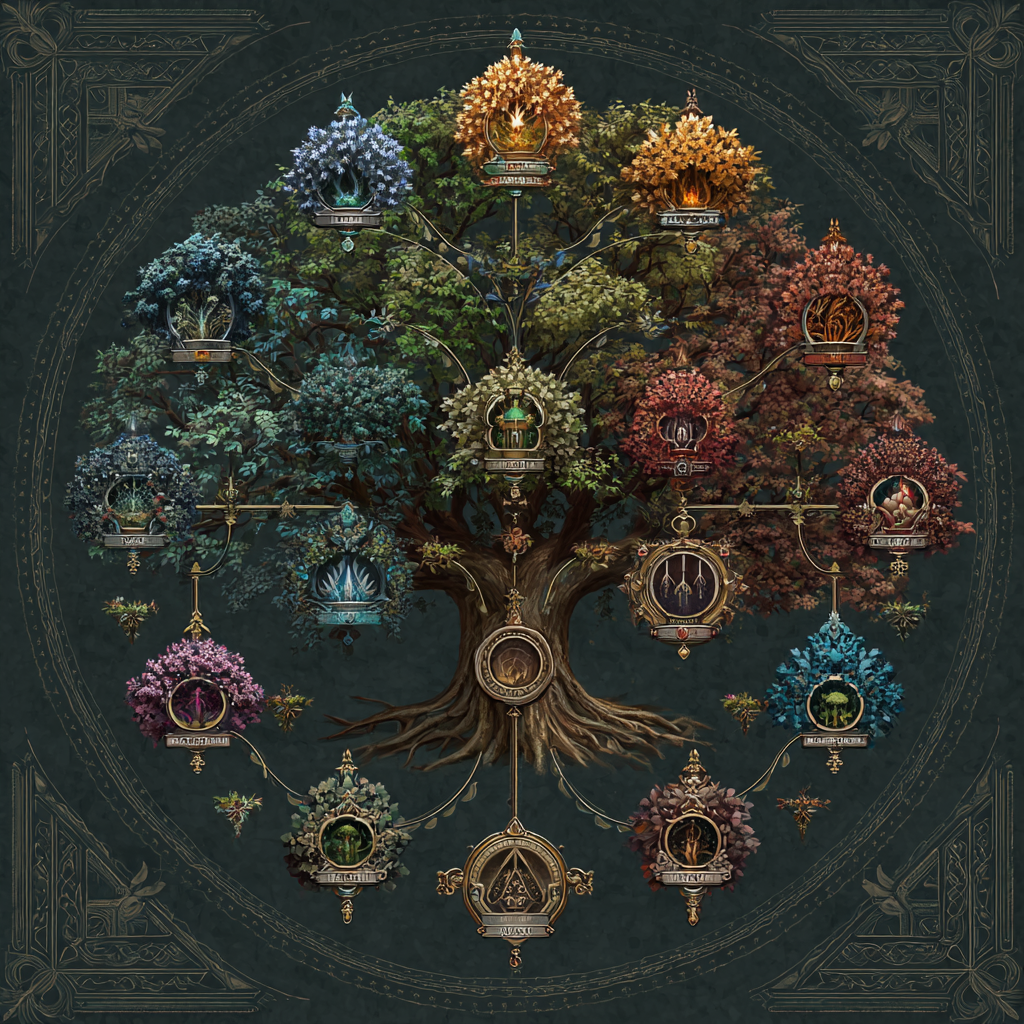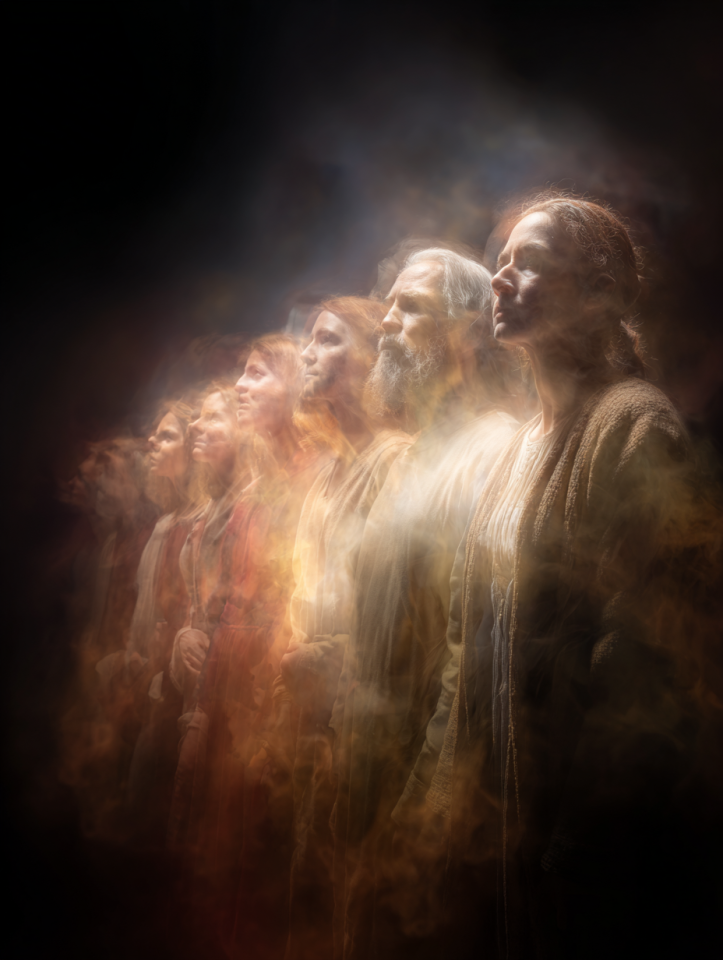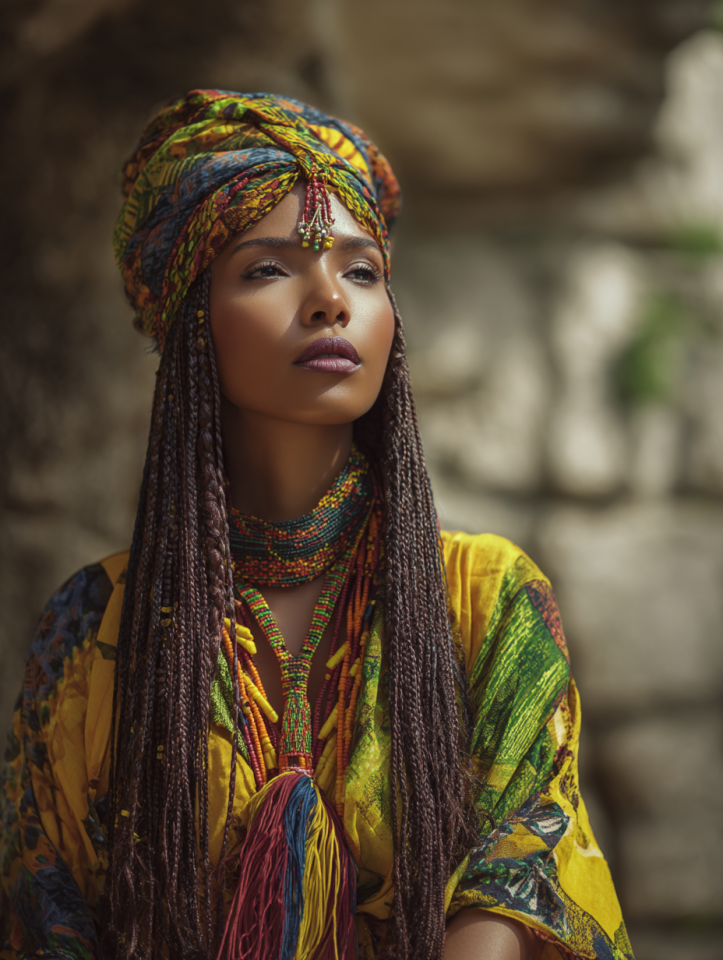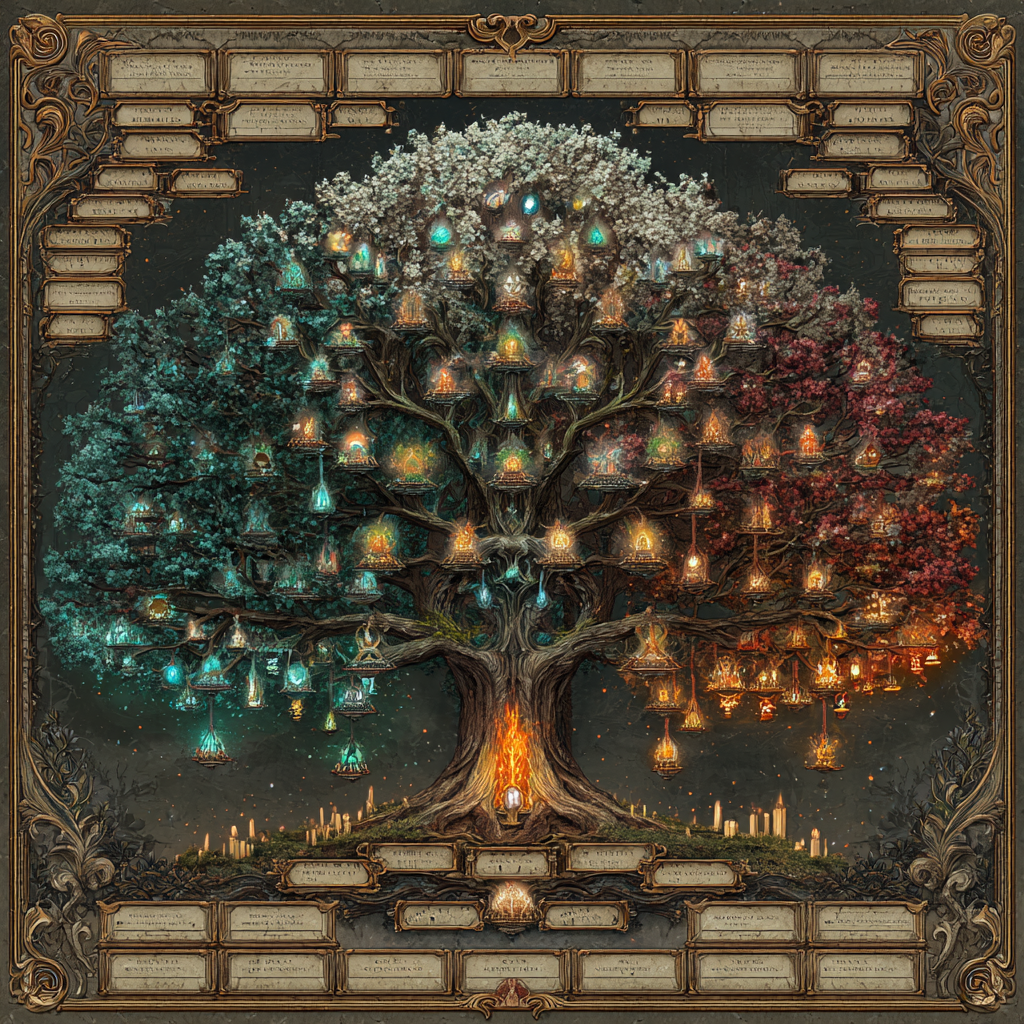Dingir Elish (DEEN-geer EH-lish)
Divine Lineage
The gods convened in the sacred place where all boundaries dissolved, where pantheons mingled without war, rivalry, or the constraints of time. It was here, in this timeless convergence, that they debated the question of continuance. Ahura Mazda, the beacon of Wisdom, was the first to speak. “We are not fading; we are realigning. The Reset is not destruction but transformation—our forces will not vanish but will instead find new forms within the restructuring of existence. Let them not remain as fading echoes but as foundational patterns, seeding the next cycle.”
Each god turned inward, reflecting on the concepts they embodied. Transformation, said Agni, “is the fire that forges renewal. Without it, how will life rise again after the Reset?” Balance, spoke Taiji, “is what keeps chaos from consuming all creation.” And Creation, whispered The Void, “is the wellspring of all that was and all that will be. It must never end.”
The gods realized that not all traits could, or even should, be carried forward. Some forces had already fulfilled their purpose. Destruction, Danger, Death, and Pain were the principal forces of the Great Reset, breaking the old world to make way for the new. But in Tír na nÓg, there would be no need for endings—only preservation, growth, and continuity.
Likewise, some aspects of existence had no place in this realm. Conflict, which thrives on war and struggle, was left behind. Bondage, the force of submission and control, could not exist where autonomy reigned. Chaos, the force of disorder and unpredictability, had no place in a realm of structured harmony. Even the Unknown, the force of secrecy and hidden knowledge, was deemed unnecessary—Tír na nÓg would be a land of wisdom, where nothing need remain obscured.
These forces, once fundamental, would not shape the new realm, for their purpose had already been met. The gods who embodied these forces did not mourn their exclusion. They had played their part. Shiva, Sekhmet, and Apophis had already wielded Destruction to cleanse the past. Ares and Teshub had brought the storms of Danger, and Hel had guided the dying to their end. Even Eris and Loki, embodiments of Chaos, had ensured the dissolution of what once was.
Now, they would not enter the new realm—not as rulers, nor as creators. Their work was done. They would not be forgotten, but neither would they shape what came next. In their place, new forces would rise—forces of harmony, transformation, and knowledge. Forces that would build rather than destroy.
At last, consensus emerged. The chosen traits would not represent dominance or power but rather the forces that nurtured existence and ensured the survival of all forms of life—physical, emotional, and cosmic. In the absence of Destruction, Danger, Death, and Pain, the new realm would be woven from forces that uplifted rather than tore apart. Instead of ruin, there would be transformation. Instead of conflict, balance. Instead of suffering, healing. Tír na nÓg would be a place where life flourished, where memory endured, and where the echoes of past wisdom guided the future without fear of an ending. Freedom was selected to honor the gift of choice, even in eternity. Compassion and Love were deemed essential to prevent a new universe from growing cold and unfeeling. Knowledge and Wisdom would guide the children of the new age, while Courage and Resilience would ensure they could endure the trials of creation.
With the attributes defined, the gods turned their attention to the question of parentage. “It must be more than chance,” said Freyja, her voice gentle but resolute. “These children will not merely inherit our power—they must embody harmony between the traits. Their existence must reflect what we wish to preserve.”
To bring this vision to life, the gods divided their efforts into two groups. El-Yahweh was entrusted with overseeing the parentage of the children who would inherit all—the El-Sod, the firstborn bearers of the traits. Asherah, the matriarch, took charge of guiding a smaller group of others who would eventually serve in Tir na nOg, ensuring the new Realm’s foundation. These advisors were essential, for their traits—though not suited for merging—were critical to the guidance and care of the El-Sod.
Asherah gathered her chosen: her son, Lior Ben Asher, along with Lilith, Hermes, Oranos, and Azrael Vale. Their essence would flow through them alone, bound not in pairs but in service. They would carry these vital concepts into the Realm, shaping its future through their presence and wisdom.
At the same time, Columbia, the youngest of the gods, offered her contribution. She bore twin sons to embody the essence of Diversity. These twins would not stand among the El-Sod but would serve alongside them, their existence a promise of inclusion and harmony. Columbia called them her "rainbow promise" to the children, the people, and the land of Tir na nOg.
The plan was set. The couples combined their essence to create the seeds of the El-Sod. The advisors did not shape the land in the way mortals craft stone or soil. Instead, they attuned themselves to the forces already woven into Tír na nÓg—the eternal structures of Memory, Thought, and Awareness. The realm was not built, but revealed; not created, but recognized as an unbroken thread in the fabric of existence. And Columbia’s twins carried the innocence, promise, and hope of a new land—untainted by the corruption that had marred so many cultures before them. As the gods took their final steps into dissolution, their essence flowed back into the vast structure of existence. They did not vanish, nor did they rule from afar, but instead became the very patterns of thought, passion, wisdom, and strength that would guide all who came after. They had not ended—they had returned to The Well of Being, ensuring that the lessons of eternity, the wisdom of ages, would weave through every force that shaped the new cycle. In the stillness before the Reset, the gods whispered a final blessing. “May you thrive without us. May you become more than what we were. And may your love for existence carry forward into the next great beginning.” And with that, the gods faded—not into silence but into legacy. They left behind not statues or temples but something far greater: a legacy of boundless love, freedom, and resilience, embodied in the children and land of Tir na nOg.

The plan was set. The couples combined their essence to create the seeds of the El-Sod. The advisors did not shape the land in the way mortals craft stone or soil. Instead, they attuned themselves to the forces already woven into Tír na nÓg—the eternal structures of Memory, Thought, and Awareness. The realm was not built, but revealed; not created, but recognized as an unbroken thread in the fabric of existence. And Columbia’s twins carried the innocence, promise, and hope of a new land—untainted by the corruption that had marred so many cultures before them. As the gods took their final steps into dissolution, their essence flowed back into the vast structure of existence. They did not vanish, nor did they rule from afar, but instead became the very patterns of thought, passion, wisdom, and strength that would guide all who came after. They had not ended—they had returned to The Well of Being, ensuring that the lessons of eternity, the wisdom of ages, would weave through every force that shaped the new cycle. In the stillness before the Reset, the gods whispered a final blessing. “May you thrive without us. May you become more than what we were. And may your love for existence carry forward into the next great beginning.” And with that, the gods faded—not into silence but into legacy. They left behind not statues or temples but something far greater: a legacy of boundless love, freedom, and resilience, embodied in the children and land of Tir na nOg.

















